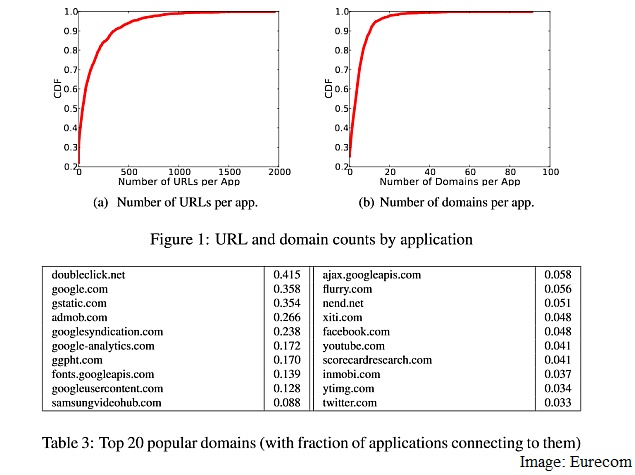Android Apps Connect to a Shocking Number of Advertisement Sites: Study

Security researchers from Eurecom developed an automated system for detecting Android apps that connect to ad sites and user tracking sites without the knowledge of the phone user. Luigi Vigneri from Eurecom started with putting almost 2,000 free Android apps from the 25 categories on Google Play to test with the new automated system.
Vigneri and his team launched every single app on a Samsung Galaxy SIII Mini running Android version 4.1.2. The device had been programmed to channel all traffic through the team's own server, thereby recording all the URLs that each app tried to access.
The study's results showed that in total almost 2,000 apps connected to 250,000 different URLs from around 2,000 top-level domains.The study added that though the majority of apps were connecting to a handful of advertisement networks and user tracking sites, some were more "prolific." The study found that Music Volume Eq, an app that manages volume, connected to almost 2,000 distinct URLs. The results are certainly shocking, leaving users to question why a music control manager app connects to such a huge number of sites.
The team added that almost 10 percent apps checked connected to 500 different URLs. The study added however that 90 percent of most frequently contacted ad-related domains were Google-run.
The truth of the matter though is that the findings of the study don't really reveal a significant danger to an Android user, and only a small number of studied apps connect to suspicious websites. However, if concerned about privacy, the study did find a large number of apps connecting to user tracking networks, even made by developers that Google has itself rated well, with top developer status.
The results showed (via MIT Technology Review) that more than 70 percent of the apps studied do not access user tracking sites, but the few that do actually connect to a significant number of sites, with one culprit, Eurosport Player, connecting to 810 different user tracking sites.
To also be noted is that Eurecom team used a smartphone running an outdated version of Android, and it is possible if the team ran the tests on a device running a more updated version of Android the results would have been different, with Google having already made changes to the back-end.
For the latest tech news and reviews, follow Gadgets 360 on X, Facebook, WhatsApp, Threads and Google News. For the latest videos on gadgets and tech, subscribe to our YouTube channel. If you want to know everything about top influencers, follow our in-house Who'sThat360 on Instagram and YouTube.
Related Stories
- Samsung Galaxy Unpacked 2025
- ChatGPT
- Redmi Note 14 Pro+
- iPhone 16
- Apple Vision Pro
- Oneplus 12
- OnePlus Nord CE 3 Lite 5G
- iPhone 13
- Xiaomi 14 Pro
- Oppo Find N3
- Tecno Spark Go (2023)
- Realme V30
- Best Phones Under 25000
- Samsung Galaxy S24 Series
- Cryptocurrency
- iQoo 12
- Samsung Galaxy S24 Ultra
- Giottus
- Samsung Galaxy Z Flip 5
- Apple 'Scary Fast'
- Housefull 5
- GoPro Hero 12 Black Review
- Invincible Season 2
- JioGlass
- HD Ready TV
- Laptop Under 50000
- Smartwatch Under 10000
- Latest Mobile Phones
- Compare Phones
- Apple iPhone 16e
- Samsung Galaxy A06 5G
- Realme P3 Pro 5G
- Realme P3x 5G
- Vivo V50
- Realme GT 7 Pro Racing Edition
- Samsung Galaxy F06 5G
- Asus ROG Phone 9 FE
- Asus Chromebook CR11
- Lenovo Yoga Slim 9i (2025)
- Asus ROG Flow Z13 (2025)
- Xiaomi Pad 7
- Huawei Huawei Band 10
- Lava Prowatch X
- Haier M95E
- Sony 65 Inches Ultra HD (4K) LED Smart TV (KD-65X74L)
- Sony PlayStation 5 Pro
- Sony PlayStation 5 Slim Digital Edition
- Blue Star 1.5 Ton 3 Star Inverter Split AC (IC318DNUHC)
- Blue Star 1.5 Ton 3 Star Inverter Split AC (IA318VKU)

















